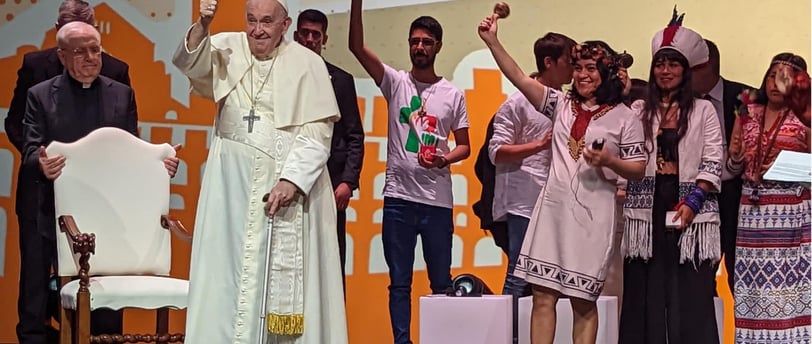The Economy of Francesco: A View from the Philippines
Global Justice Overcoming Poverty, Volume 12-6, November 2022
Anna Rose D. Esguerra
12/14/20223 min read


The cry of nature is also the cry of the poor. Extreme events – typhoons, flooding, drought, food and water shortages, health crises, displacement of indigenous people, and killings – threaten people most especially the poor and vulnerable ones. Women, children, persons with disabilities, indigenous people, and other marginalized groups bear the brunt of inequality issues that are deeply rooted in the impacts of climate change.
The Philippines is one of the world's most disaster-prone countries. According to the World Risk Index (WRI) 2022, the Philippines ranks first with a WRI equivalent of 46.82. The WRI is a tool used to assess and estimate the disaster risk of a country from earthquakes, hurricanes/typhoons, floods, drought, sea-level rise, tsunamis and conflicts.
According to the Philippine Statistics Authority (PSA), in 2021, the total family income of the upper 10 per cent income group was 7.02 times as much as that of the bottom 10 per cent income group. (There has been a slight improvement in income inequality in the period 2018 – 2021from 0.4267 to 0.4119.)
Many of the climate change impacts are disproportionately suffered by the poorest groups in society. The agriculture sector is especially vulnerable to severe diminishment of agricultural productivity. Most of the population depends on the agriculture sector. The poor and marginalised call for appropriate actions toward climate change impacts. The 21st-century challenge is to address climate change which is not only an environmental crisis but also a social crisis compelling ambitious actions to address inequalities between wealthy and poor economies, between rich and poor families within countries, between genders and generations. Without prompt and effective adaptation and mitigation measures, climate change is likely to intensify income and social inequality and slacken poverty alleviation.
On 24th of September 2022, Pope Francis and young changemakers from all over the world sealed a covenant committed to a renewed economy – ‘one that brings life not death, one that is inclusive and not exclusive, humane and not dehumanising, one that cares for the environment and does not despoil it’. Tomorrow's economy gives importance to the poorest of the poor and a culture of communion based on fraternity and equality.
Pope Francis was sending a message to a global event held in Assisi, Italy, under the auspices of the ‘Economy of Francesco’ (EoF) movement, named after St Francis of Assisi, who became one with the poor. EoF brings together this example of the embracing of the poor with the prophetic writings of Pope Francis, Laudato Si and Fratelli Tutti. While holding firm to sound conceptual and practical principles, it remains open to fresh ideas and perspectives. World-renowned scientists and economists shared their best insights and understandings in the world gathering in Assisi.
Kate Raworth's Doughnut Economics seeks to ensure that no human being falls short of life's essentials while protecting the Earth's life-supporting systems. The ‘donut’ of social and planetary boundaries acts as a compass for human progress in the 21st century.
Vandana Shiva emphasised that the term ‘economia’ should be defined as the art of living, of sharing, of the well-being of everyone, and of abundance. She further dwelt on the ‘economy of nature’ where natural resources will be converted into commodities in the market to derive ‘gross national happiness’. Lastly, she noted that ‘prosperity comes from giving, not in accumulating wealth’.
The entire human population is falling into ruin as millions of the poorest and the most vulnerable people bear the wrath of an overexploited nature. In 1206 St. Francis of Assisi, while praying in the Church of San Damiano, heard a voice saying ‘Francis, go and repair my house which, as you see, is falling into ruin’. This was Christ's call to Francis and His voice was heard. We are all invited to respond to this same call.
